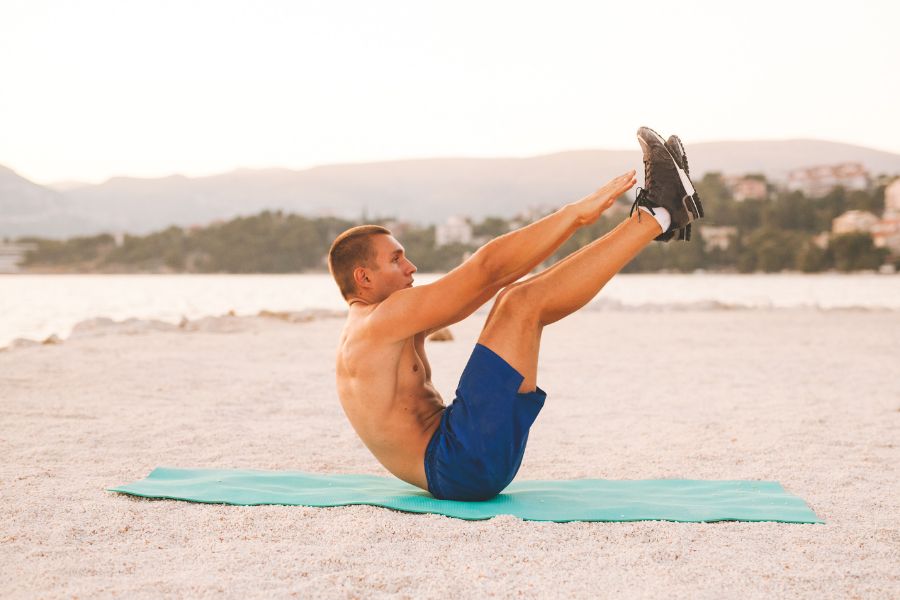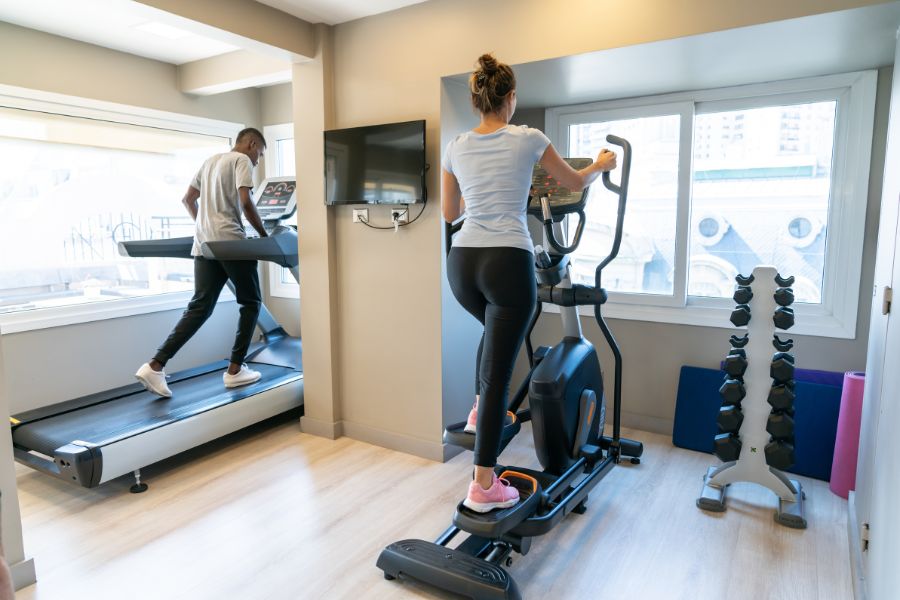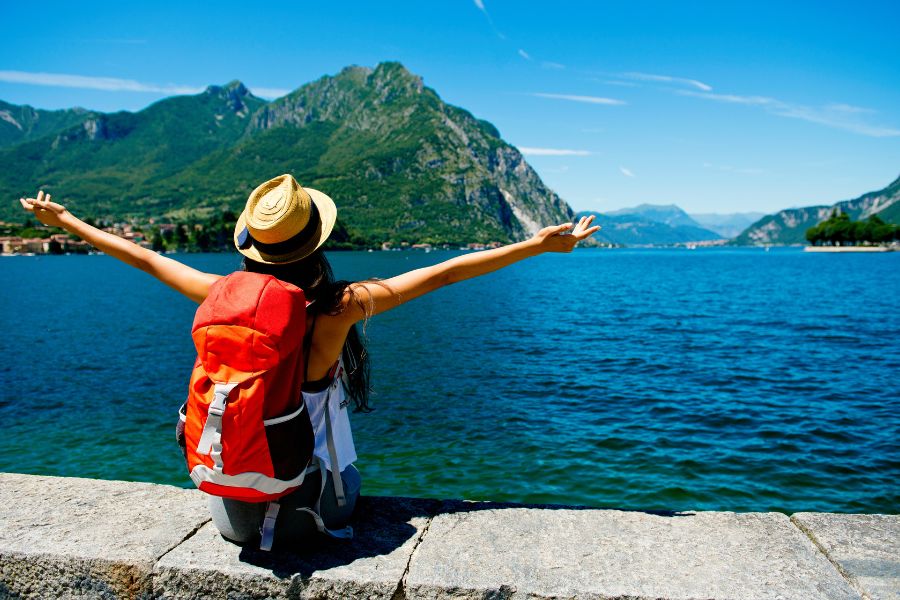Whether you’re jetting off for business or escaping on vacation, travel can easily derail your health habits.
It’s hard enough to stick to a routine at home—throw in jet lag, airport food, and unfamiliar surroundings, and even the most committed can fall off track.
But staying healthy while traveling doesn’t have to mean perfection.
We asked eight experts—from personal trainers to nutrition coaches—how they keep up with fitness and nutrition routines on the road. Their answers are refreshingly real and incredibly doable.
Stick to What’s Doable

My most effective strategy for maintaining my fitness and nutrition routine while traveling is to shift from perfection to what’s manageable.
I focus on staying grounded in what’s realistic rather than what’s “ideal.” That means planning ahead where I can, but also allowing flexibility, so I don’t spiral into guilt or all-or-nothing thinking if things change.
For example, on my recent trip to Crete, I didn’t try to stick to my exact gym routine. Instead, I walked daily, stayed active in ways that felt fun, and made food choices based on how I wanted to feel, not based on rigid rules. I also brought essentials like protein bars, supplements, and a mini resistance band, so I had low-pressure options available.
The key for me is mindset: I ask, “What will support me today?” and not “What should I be doing?” That small shift keeps me consistent, even when I’m in a different environment. As someone with ADHD and autism, that approach helps me avoid burnout, anxiety, and the urge to mask or people-please around food and fitness.
Rhiannon Cooper, Neurodivergent Personal Trainer, Not So Typical Fitness
Use Moderation as Your Guide
Socrates believed moderation was a key element of self-mastery and virtue.
When traveling, I recommend moderation in maintaining good habits and in exploring new experiences.
For example, try to keep your fitness routine to some degree. Try to maintain the same frequency of workouts (e.g., 2-3 times/week) and attempt to perform similar exercises that you usually do.
A moderate (50-75% level) of your usual exercise while on vacation is sufficient to maintain your fitness. (With moderate exercise, your heart rate and breathing are faster, but you are still able to carry on a conversation, according to the CDC).
By all means, try new foods and drinks if you are visiting a new culture.
However, try new dishes in moderation. Order small servings and/or share with someone else to avoid overindulging.
Julia Child once said, “Small helpings. Sample everything. These are the secrets of happiness and good health.”
Keep a water bottle close by at all times so you can drink when you are thirsty instead of playing catch-up later.
And lastly, ensure your schedule is moderately busy, not jam-packed. You will experience, enjoy, and savor your activities more.
Jerome Enad, MD, FAANA, ACSM-CEP, Independent Contractor
Blend Fitness into the Trip

When traveling with top-level athletes, we don’t treat fitness and nutrition as something to squeeze in. They are built into the flow of the trip.
On our trail-based trips, we start most mornings with mobility work or light bodyweight routines at the trailhead. This sets the tone and helps everyone stay alert, even when adjusting to new time zones.
Some days, after finishing a 14-kilometer hike, we still do a sunset stretching session with a local instructor. It helps keep the body ready without overdoing it.
Following a solid nutrition plan is easier when meals are part of the recovery process. I work closely with local hosts to ensure meals are both nutrient-rich and authentic, like chickpea stews with protein in Morocco or fermented vegetables in the Balkans.
A few top cyclists I’ve traveled with bring their own electrolyte mix or protein powder, but most of the time, we find what we need right at the table. It becomes a conversation, not only about eating well but also about understanding food through local culture.
The key for us is building movement and nutrition into the rhythm of each day. This way, no one has to scramble to fit in a workout or stress about their meals. It becomes a daily rhythm, not a strict routine.
Nune Tatunts, CEO & the Founder, Cascade Travel
Pack for Health Like a Pro
Travel throws your routine out the window, but it doesn’t have to trash your health.
A bit of planning and a few key staples can keep your digestion, energy, and cravings in check wherever you end up.
I’ve road-tested these strategies myself and seen my private health coaching clients thrive with them when they’re away from home.
What to Pack from Home:
- Pocket protein: nut butter squeeze packs, clean protein powder (portioned into zipper bags), grass-fed jerky or biltong, or shelf-stable tuna/salmon pouches, even freeze-dried bone broth (grass-fed only)
- DIY snack packs: dry-roasted chickpeas or favas, seaweed snacks, almond flour crackers, pre-portioned trail mix (nuts, seeds, and a few cacao nibs or coconut flakes)
- Travel-friendly produce: apples, oranges, snap peas, or firm cucumbers and carrots – all can stay out of the fridge for a day (longer for oranges and apples)
- Gut and digestion support: ginger or peppermint tea bags, shelf-stable probiotics, digestive enzymes
- Staying regular: Chia go-packs: chia seeds portioned into small baggies to mix into water, nut milk, soup, or oatmeal; baggie of prunes; magnesium pills or gummies
- DIY mini bar kit: your own hotel mini bar makeover—tinned sardines (that don’t require a can opener), nut butter, grain-free crackers, collagen sticks, seaweed snacks
- Hydration hacks: electrolyte packets without artificial sweeteners—LMNT or Cure Hydration work well
Missy Lapine, The Functional Health Coach, HEAL THRU FOOD
Pack Smart and Move Daily
Preparation and prioritization are key to staying on track while traveling, not perfect execution.
I always pack portable animal protein sources like jerky, canned sardines, and hard-boiled eggs, then immediately locate the nearest grocery store upon arrival for fresh foods.
Rather than obsessing over perfect workouts, I focus on daily movement minimums—20 minutes of bodyweight exercises in my hotel room and walking everywhere instead of using rideshares.
Remember that consistency beats perfection: maintaining 80% of your routine while traveling prevents the complete derailment that leads to the post-vacation spiral.
Pavlo Chernikov, Marketing Manager, Pavlo Chernikov
Try Fasting and Flexible Training

Nutrition-wise, I practice intermittent fasting, so I don’t worry about what to eat first thing in the morning.
I fast for 16-18 hours daily and keep track of my calories and macros with a fitness app, so I don’t have to calculate anything in my head.
I just stay close to my numbers, and it works well.
When it comes to working out, I’ll look for local gyms, and if I can’t find one nearby, I’ll do calisthenics with high volume so I can still get a workout in wherever I go.
I’m also a big proponent of walking 10,000 steps a day, so I will walk anywhere I go instead of driving.
This keeps me active and eating within my numbers anywhere I go.
Jose Guevara, Fitness Instructor / Home Gym Equipment Tester, ShreddedDad.com
Consistency Beats Perfection
When everything else is chaos, your workout needs to be easy.
When I travel for work, the days are stacked with meetings, and the nights usually roll into dinner and drinks.
I’ve learned to take the friction out of training by finding a hotel with a gym or a local spot that’s open late and staffed. Don’t overthink it.
The goal isn’t to stick to your perfect program or chase PBs. The win is just getting a session in.
Consistency beats perfection, especially when you’re living out of a suitcase.
Adam Boucher, Head of Marketing, Turtle Strength
Plan Ahead, Then Stick with It

When I’m on the road for client meetings or conferences, staying on top of fitness and nutrition comes down to two things: planning and discipline.
Before I travel, I scout the hotel’s fitness facilities, look for nearby parks or gyms, and pack compact gear like resistance bands or a yoga mat.
I also research healthy food options around the area to avoid defaulting to fast food.
For nutrition, I aim to keep it simple: I stick to whole foods like grilled proteins, salads, and fruits, and I stay hydrated.
Intermittent fasting also helps—it gives me structure and keeps my energy levels stable. I view fitness as non-negotiable, not an afterthought.
Whether it’s a 20-minute bodyweight session in the hotel room or a quick jog outdoors, I make it happen.
The key is consistency over perfection—no matter where I am, I aim to keep moving and stay mindful of what I eat.
Eugene Leow Zhao Wei, Director, Marketing Agency Singapore
Final Thoughts
Staying healthy while traveling isn’t about sticking to a perfect plan—it’s about having flexible tools, a supportive mindset, and a bit of preparation.
Whether it’s walking instead of driving, packing protein snacks, or doing a 20-minute bodyweight workout in your hotel room, consistency beats perfection every time.
So the next time you’re away from home, don’t aim to do it all. Just aim to do enough—and enjoy the journey.

Leave a Reply